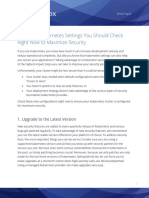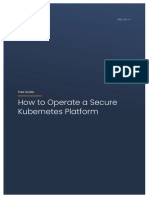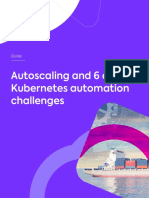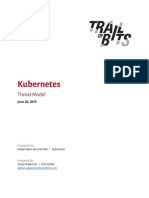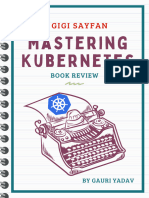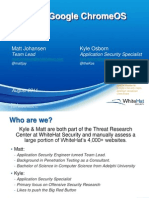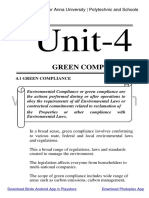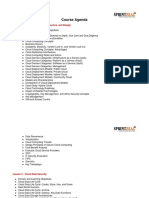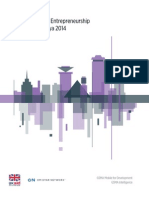Linux Foundation
KCSA Exam
Clouds and Containers
Questions & Answers
(Demo Version - Limited Content)
Thank you for Downloading KCSA exam PDF Demo
Get Full File:
https://dumpstoday.com/kcsa-dumps/
�Questions & Answers PDF Page 2
Question: 1
Why is controlling access to persistent storage crucial in Kubernetes from a security perspective?
A. To optimize the allocation of storage resources among different applications
B. To prevent data leakage or unauthorized access to sensitive information stored on persistent
volumes
C. To enhance the performance and speed of access to storage resources
D. To ensure high availability and redundancy of data in the cluster
Answer: B
Explanation:
Correct Answer: B. To prevent data leakage or unauthorized access to sensitive information stored on
persistent volumes Explanation: Controlling access to persistent storage in Kubernetes is crucial from a
security perspective to prevent data leakage or unauthorized access to sensitive information. Persistent
storage often contains critical data, and improper access control can lead to security breaches where
sensitive data is exposed or stolen. By implementing strict access controls, such as role-based access
control (RBAC) and network policies, organizations can ensure that only authorized users and
applications have access to this data, thus maintaining data confidentiality and integrity. Option A is
incorrect. Optimizing the allocation of storage resources among applications is important for operational
efficiency, but it does not directly address the security risks associated with persistent storage access.
Option C is incorrect. Enhancing performance and speed of access to storage resources is a
performance goal, not a primary security concern regarding access to persistent storage. Option D is
incorrect. Ensuring high availability and redundancy is critical for data reliability, but it does not
specifically address the security concerns of controlling access to persistent storage.
Question: 2
Within the 4Cs of Cloud Native Security, which component emphasizes the security of the
codebase, including practices like code review, vulnerability scanning, and secure coding
standards?
A. Cloud Security
B. Cluster Security
C. Container Security
D. Code Security
Answer: D
Explanation:
Correct Answer: D. Code Security Explanation: Code Security is a critical component of the 4Cs of Cloud
Native Security that emphasizes ensuring the security of the application code. This includes practices
like code reviews, vulnerability scanning, and adherence to secure coding standards to prevent security
flaws and vulnerabilities in the software. Option A is incorrect. Cloud Security refers to securing the
www.dumpstoday.com
�Questions & Answers PDF Page 3
underlying infrastructure of cloud platforms, which is different from securing the application code itself.
Option B is incorrect. Cluster Security focuses on securing the orchestration layer in cloud-native
environments, such as Kubernetes clusters, and does not directly deal with application code security.
Option C is incorrect. Container Security is about securing the container runtime and the containers,
focusing on isolation, network security, and runtime environment, rather than the application code.
Question: 3
For ensuring compliance with regulatory standards in a cloud-native environment, which of the
following is the most effective approach?
A. Continuous Integration/Continuous Deployment (CI/CD) Pipelines
B. Regular Security Audits and Compliance Scans
C. Resource Quota Enforcement
D. Implementation of a Service Mesh
Answer: B
Explanation:
Correct Answer: B. Regular Security Audits and Compliance Scans Explanation: Regular security audits
and compliance scans are the most effective approach for ensuring that a cloud-native environment
remains in compliance with regulatory standards. These practices help in identifying non-compliance
issues and security vulnerabilities, thereby ensuring that the environment meets the necessary
regulatory requirements. Option A is incorrect. Continuous Integration/Continuous Deployment (CI/CD)
Pipelines are crucial for software delivery but are not specifically designed for regulatory compliance.
Option C is incorrect. Resource Quota Enforcement is important for managing resources within a
Kubernetes environment but does not directly contribute to regulatory compliance. Option D is incorrect.
Implementation of a Service Mesh can improve network control and observability but is not primarily
focused on ensuring compliance with regulatory standards.
Question: 4
What is an essential security measure for the Kubernetes API Server to prevent unauthorized
access to cluster resources?
A. Configuring autoscaling policies for the API Server
B. Implementing network policies specific to the API Server
C. Using Role-Based Access Control (RBAC) for API requests
D. Regularly updating container runtime environments in the cluster
Answer: C
Explanation:
Correct Answer: C. Using Role-Based Access Control (RBAC) for API requests Explanation:
Implementing Role-Based Access Control (RBAC) for API requests is crucial for the security of the
Kubernetes API Server. RBAC allows administrators to define and enforce policies that specify which
operations are allowed for users and services within the cluster. This control is essential to prevent
unauthorized access and manipulation of cluster resources through the API Server. Option A is incorrect.
www.dumpstoday.com
�Questions & Answers PDF Page 4
Configuring autoscaling policies is more related to performance management and does not directly
contribute to securing the API Server against unauthorized access. Option B is incorrect. While network
policies are important for controlling pod-to-pod communication, they are not the primary method for
securing the API Server against unauthorized access. Option D is incorrect. Regularly updating container
runtime environments is good practice for overall cluster security but does not specifically
target the security of the API Server in terms of access control
Question: 5
What is a critical security practice for the Kubernetes Controller Manager to ensure the integrity
of the cluster’s control plane?
A. Regularly updating the Controller Manager to the latest version
B. Implementing Horizontal Pod Autoscaling for the Controller Manager pods
C. Configuring network policies specifically for the Controller Manager
D. Using a Service Mesh for managing Controller Manager traffic
Answer: A
Explanation:
Correct Answer: A. Regularly updating the Controller Manager to the latest version Explanation:
Regularly updating the Kubernetes Controller Manager to the latest version is a critical security practice.
This ensures that the Controller Manager, a key component of the cluster's control plane, has the latest
security patches and improvements. Keeping it updated helps protect against known vulnerabilities and
exploits that could compromise the integrity of the cluster's control plane. Option B is incorrect. While
Horizontal Pod Autoscaling is important for managing resources, it does not directly impact the security
and integrity of the control plane managed by the Controller Manager. Option C is incorrect. Configuring
network policies is important for overall cluster network security but does not specifically address the
security and integrity of the Controller Manager as a control plane component. Option D is incorrect.
Using a Service Mesh can improve traffic management, but it is not a direct method for ensuring the
security and integrity of the Controller Manager in the cluster's control plane.
www.dumpstoday.com
� Thank You for trying KCSA PDF Demo
https://dumpstoday.com/kcsa-dumps/
Start Your KCSA Preparation
[Limited Time Offer] Use Coupon " SAVE20 " for extra 20%
discount the purchase of PDF file. Test your
KCSA preparation with actual exam questions
www.dumpstoday.com






